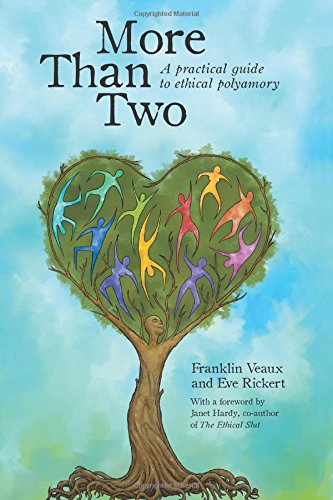
Click on cover to buy this book from Amazon.com
www.ejhs.org
Foreword by janet w. hardy

Click on cover to buy this book from Amazon.com
Over the past few years I have reviewed several new books on Polyamory. Each one had something to offer the reader who was new to, or struggling with, polyamory. In this latest offering, Franklin and Eve summarize the topic in a very readable and quite complete way. It was edited by a highly qualified editor well versed in polyamory, and was supported by an online fund raising effort from the poly community. It may be obtained in the Kindle version and hard copies are now available in bookstores.
Eve and Franklin have years of poly experience and bring to this book their personal experience and hard earned knowledge, their joys and their mistakes. It is a pleasure to read and is full of ideas helpful to anyone in, or considering, multiple consensual open loving relationships.
A core value promoted in the book is the idea of flexibility. We are raised in a culture that has only a few paths to successful romantic love and enjoyable sexuality. Society expects us to follow a specific trajectory the authors call the “relationship escalator”. But love is ever changing in each life, its intensity varies within any relationship and we need to learn how to deal with this. In spite of our culture, there is no “one way” to deal with this without the themes of this book “Trust, Courage, Abundance, Ethics and Empowerment”. This book will be of value even to monogamous couples.
They define Courage as a verb, something you have not something you do. Allowing, and trusting, people to make their own choices without trying to control them is scary and knowing they are staying as their own choice is joyful.
Ethical relationships are something we do, not something we have. Being an ethical person means looking at the consequences of our choices on others.
The authors assume that you:
These lead to two axioms which are a lens through which relationships should be viewed:
Relationships are consensual and people are not need-fulfillment machines. People cannot and should not be required to remain in any relationship. If it does not meet the needs of the people in it, it should end.
There is a wealth of good information on communication. They propose a radical strategy to deal with what people say: In the absence of concrete evidence to the contrary, believe them. There is a lot of help on definitions and difficult words, like reasonable and its evil twin, unreasonable. In the poly context it is hard to get away from the cultural context of such words.
There is a big section on Poly Frameworks helping to understand the wide diversity of poly relationships. Another is called The Poly Reality, including a chapter on Sex and Laundry. The final section is on The Poly Ecosystem, on partners and their partners, and finding partners.
I could go on but I really don’t need to say more, it is a wonderful book and I think everyone who is in, or considering, open and honest relationships should read this book. It hit the bookshelves in September.
Update 9/20/14